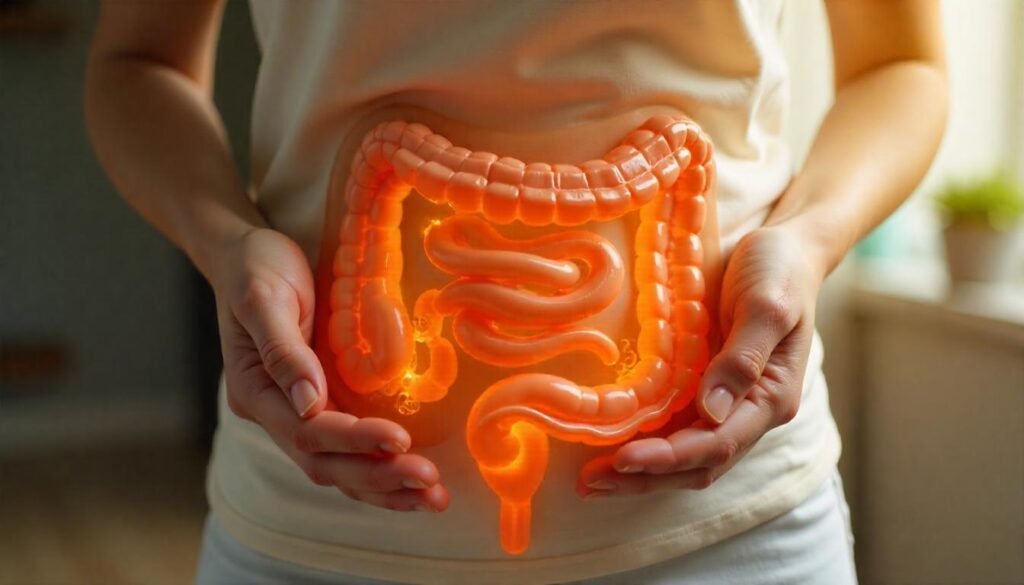Introduction
This article discusses effective home remedies for bloating and gas relief. Bloating and gas are common digestive issues that affect people of all ages—ranging from occasional discomfort after a heavy meal to persistent symptoms that disrupt daily life. Fortunately, many simple, home remedies for bloating and home remedies for gas offer safe, accessible relief without prescription medications. In this article, we share 20 evidence-based strategies—rooted in clinical studies, expert insights, and physiological principles—to ease symptoms, support digestion, and promote wellness.
This guide is designed for everyone: patients seeking quick self-care, caregivers supporting loved ones, and healthcare professionals looking for practical adjunct strategies. We avoid sensationalism and fear-based language, instead prioritizing medically accurate, non-judgmental advice. You’ll find natural teas, gentle massage techniques, dietary tweaks, and safe lifestyle changes, all grounded in studies from PubMed and reputable clinical reviews.
Please note: while these home remedies for bloating are generally safe, they’re not a substitute for professional care. If symptoms are severe, persistent, or concerning, consult a healthcare provider. Now, let’s explore the 20 beginner-friendly home remedies to help you find relief and rediscover digestive comfort.
Table of Contents

Main Body
Understanding Bloating & Gas
Causes
- Digestive fermentation: The natural processes occurring within our digestive system involve gut bacteria, which play a crucial role in processing carbohydrates that the body is unable to digest on its own. These undigested carbohydrates, which can include certain types of food such as beans and broccoli, are then broken down by these bacteria. This breakdown process, while a normal part of digestion, results in the production of gas as a byproduct.
- Swallowed air: The rapid consumption of food, along with habits like chewing gum, and the intake of carbonated drinks, are all potential contributors to increased air swallowing. When we eat too fast, we tend to gulp down air along with our food. Similarly, the act of chewing gum for extended periods can lead to the inadvertent ingestion of air. Furthermore, carbonated beverages, due to their inherent gaseous nature, introduce additional air into our digestive systems as we drink them. Therefore, these common habits can collectively result in the swallowing of excessive amounts of air.
- Digestive disorders: Irritable bowel syndrome (IBS), an intestinal disorder causing pain in the stomach, gas, diarrhea and constipation, dysbiosis, a microbial imbalance or maladaptation inside the body, lactose intolerance, an adverse reaction to lactose in dairy products causing bloating and diarrhea, and small intestinal bacterial overgrowth (SIBO), a condition in which there are excessive bacteria in the small intestine.
- Constipation: When the passage of contents through the digestive system is slower than normal, it can lead to the accumulation of gas within the intestines, which subsequently results in abdominal distension. This distension, characterized by a noticeable swelling or bloating of the abdomen, arises directly from the excessive gas buildup that the slowed transit facilitates.
- Lifestyle factors: Both stress and insufficient hydration can have adverse effects on the functioning of the gut, specifically impacting its ability to effectively move and process food. When the body experiences stress, various physiological responses can interfere with normal digestive processes, leading to reduced gut motility. Similarly, when the body is not adequately hydrated, the lack of sufficient fluids can hinder the smooth passage of food through the digestive tract, also resulting in decreased gut motility.

Symptoms
- Visible abdominal swelling (“belly bloat”)
- Excessive flatulence
- Abdominal discomfort, cramps
- Feeling full or tight after meals
When to See a Doctor
Seek medical advice promptly if you experience:
- Unintentional weight loss
- Rectal bleeding or dark stool
- Severe, persistent abdominal pain or vomiting
- Persistent fever or signs of infection
These can indicate serious conditions such as inflammatory bowel disease, celiac disease, or gastrointestinal obstruction. (Source: Mayo Clinic)
20 Evidence-Based Home Remedies for Bloating & Gas
Below is a comprehensive table summarizing each remedy, how it works, and supporting evidence:
| # | Remedy | How It Works / Evidence | Notes & Usage |
|---|---|---|---|
| 1 | Peppermint Tea for Bloating | Menthol relaxes GI smooth muscle; RCTs show IBS symptom improvement eatingwell.comhealth.comverywellhealth.com | Brew 5–10 min; 2–3 cups daily; avoid reflux cases |
| 2 | Ginger Infusion | Stimulates gastric emptying; contains anti‑inflammatory gingerol | Slice fresh ginger; steep; 2–3 times daily |
| 3 | Abdominal Massage | Promotes motility, relieves distension | 10–15 min clockwise; gentle pressure around belly |
| 4 | Activated Charcoal (Short-Term) | Adsorbs gas; small RCTs show symptom relief | Single dose, not daily; consult provider |
| 5 | Apple Cider Vinegar (ACV) | May support digestion via acidic environment; anecdotal evidence | 1 tsp in water before meals; not for reflux |
| 6 | Fennel Seeds | Muscle relaxant in GI tract (carminative); small studies show relief | Chew after meal or brew tea |
| 7 | Chamomile Tea | Anti-spasmodic and anti-inflammatory; may soothe gut | Drink after meals or before bed |
| 8 | Probiotic Yogurt | Balances microbiota; endorsed in digestive health studies | Use plain, unsweetened yogurt with live cultures |
| 9 | Warm Lemon Honey Drink | Aids digestion, mild laxative effects | Warm before or between meals |
| 10 | Caraway Seeds | Helps reduce gas, supports digestion in studies | Brew tea or chew seeds |
| 11 | Low‑FODMAP Diet Adjustments | Reduces fermentable carbs; clinical evidence from Monash University | Start with guidance; gradually reintroduce foods |
| 12 | Cumin & Ajwain Infusion (Pakistan) | Traditional use for gas relief; cumin shown to reduce bloating | Brew herbal infusion post-meal |
| 13 | Hydration & Electrolytes | Prevents constipation-related gas buildup | Drink water regularly, especially warm water |
| 14 | Gentle Yoga Poses (e.g., Pavanamuktasana) | Stimulates bowel movement, relieves gas | Hold poses gently for gas relief |
| 15 | Deep Breathing Exercises | Reduces air swallowing and diaphragmatic tension | 3–5 minutes post-meal, focus on calm belly breaths |
| 16 | Walk After Meals | Promotes gastric motility, reduces bloating | 10–15 min gentle walk; repeats daily |
| 17 | Avoid Carbonated Beverages | Prevents trapped gas due to CO₂ intake | Opt for water or herbal teas |
| 18 | Mindful Eating | Reduces air ingestion and overeating | Chew food slowly; pause between bites |
| 19 | Low-Dose Magnesium Citrate | Supports motility in constipation-related bloating | Under provider guidance; short-term use only |
| 20 | Heat Therapy (Warm Compress) | Relaxes abdominal muscles to relieve spasms | Use 10–15 min on low setting post-meal |
In-Depth Remedy Details
1. Ginger Immune
Menthol—a primary compound in peppermint—acts as a smooth muscle relaxant, reducing cramps and spasms in the intestines. Clinical trials indicate peppermint oil significantly alleviates IBS symptoms, including gas and bloating pubmed.ncbi.nlm.nih.gov+15pubmed.ncbi.nlm.nih.gov+15pmc.ncbi.nlm.nih.gov+15. Pure tea is gentler but still yields benefit.
Usage: Steep 1–2 tsp dried leaves for 5–10 minutes; drink warm, 2–3 times daily.
Note: Avoid if you suffer from GERD or hiatal hernia.
2. Turmeric Ginger Tea Immune Boost
Gingerol compounds enhance gastric emptying and reduce inflammation. Dietitian‑recommended for debloating after heavy or spicy meals pmc.ncbi.nlm.nih.govpubmed.ncbi.nlm.nih.gov+2pubmed.ncbi.nlm.nih.gov+2healthline.com+2.
Usage: Slice ~1 inch fresh ginger; steep for 10 minutes; drink up to 3 times daily.

3. Abdominal Massage for Bloating
Studies show abdominal massage reduces distension and improves bowel transit times, especially in postoperative or constipation cases pmc.ncbi.nlm.nih.gov+3sciencedirect.com+3verywellhealth.com+3.
Method: Use clockwise strokes above the belly button for 10–15 minutes daily.
4. Activated Charcoal
Charcoal binds gas in the gut, proven in some small studies. Use only occasionally, never long term, and avoid with other medications due to absorption interference.
Prevention & Lifestyle Tips
- Eat smaller, frequent meals (4–6) to avoid overloading digestion.
- Keep a food-and-symptom diary to identify triggers.
- Drink plenty of water; warm liquids aid motility.
- Walk or move 10–15 minutes after meals.
- Practice stress-reduction: deep breathing, meditation.
- Avoid gum, straws, carbonated drinks to limit swallowed air.
- Review medications that may cause gas (e.g., certain laxatives or fiber supplements).
- Consult a healthcare provider if you experience persistent bloating, diarrhea, or unexplained weight loss.
Conclusion
These 20 beginner-friendly home remedies for bloating and gas offer evidence-based, safe, and practical ways to ease digestive discomfort. From soothing teas like peppermint and ginger to gentle techniques like abdominal massage and mindful eating, each strategy supports digestive wellness naturally. They align with both clinical insights and real-world healthcare practices, making them ideal for patients, caregivers, and healthcare professionals.
Remember: these home remedies for bloating and gas complement—not replace—medical care. If symptoms are severe, persistent, or accompanied by red‑flag signs (bleeding, weight loss, intense pain), seek professional evaluation. Talk to your doctor before starting remedies, especially if pregnant, taking medications, or managing chronic conditions.
FAQs
Q1: What is the fastest home remedy for gas?
A: A warm cup of peppermint tea or gentle abdominal massage can provide relief in 10–15 minutes. Combining both often works best.
Q2: Is peppermint tea effective for bloating?
A: Yes—menthol in peppermint relaxes smooth muscles and is backed by multiple clinical studies showing improvement in gas and cramps health.comeatingwell.com.
Q3: Can abdominal massage reduce bloating?
A: Clinical and RCT-based evidence shows that gentle, clockwise massage relieves bloating by improving bowel movement and reducing distension .
Q4: Is it safe to use activated charcoal for gas?
A: Occasional use is fine, but long-term use can cause nutrient and medication absorption issues. Always consult a healthcare provider before use.
Q5: Does low-FODMAP diet help with bloating?
A: Yes. A low-FODMAP dietary approach significantly reduces bloating and IBS-related symptoms when guided by a trained dietitian.



